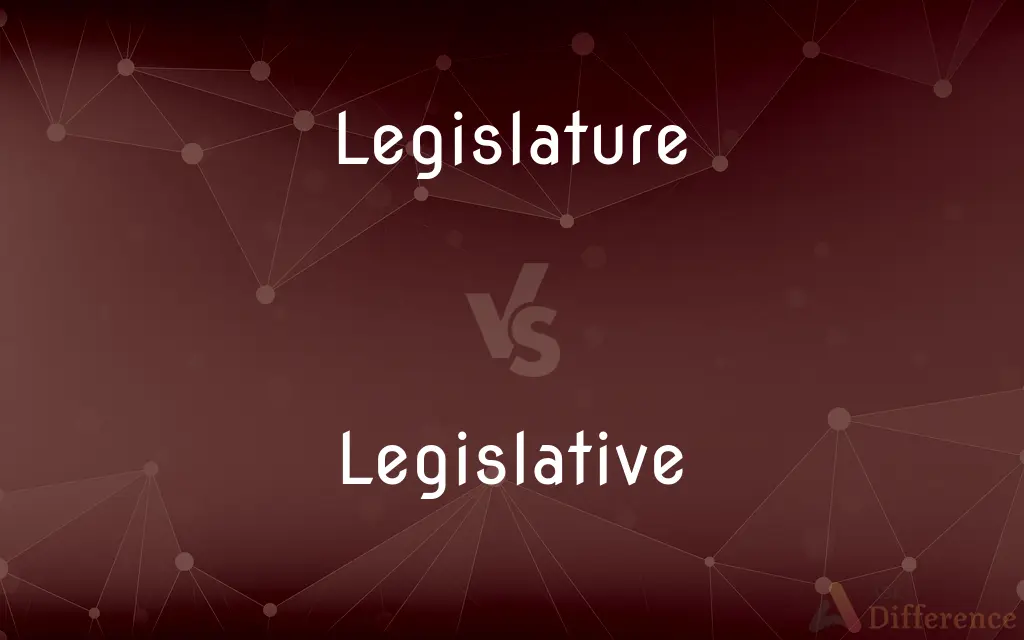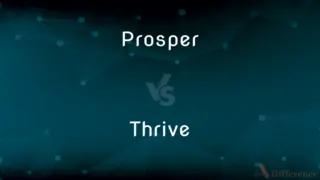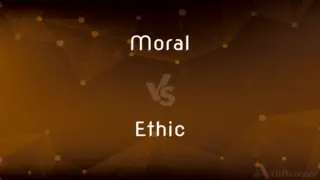Legislature vs. Legislative — What's the Difference?
By Tayyaba Rehman & Maham Liaqat — Updated on April 2, 2024
Legislature refers to a governmental body that makes laws, while legislative pertains to the process of making or enacting laws.

Difference Between Legislature and Legislative
Table of Contents
ADVERTISEMENT
Key Differences
Legislatures operate within a framework that allows them to draft, propose, debate, amend, and finally enact laws. The legislative process includes various stages, such as committee review, public hearings, and voting sessions. Legislative activities, therefore, encompass all tasks and procedures involved in this comprehensive process.
The relationship between the legislature and the legislative process is intrinsic. The legislature is the body that performs legislative functions. This includes not only the creation of laws but also the amendment or repeal of existing laws. The effectiveness of legislative actions often depends on the legislature’s composition, procedures, and the broader political context.
Legislative power is a cornerstone of democratic governance, providing a mechanism for the expression of public will and the regulation of society. Legislative measures reflect the priorities and values of a society, and as such, the legislative process is subject to intense scrutiny, debate, and public input to ensure laws serve the public interest.
Comparison Chart
Definition
A governmental body that makes laws.
Pertaining to the process of making laws.
Nature
Noun – An entity or group.
Adjective – Describes activities or attributes.
ADVERTISEMENT
Function
To draft, debate, amend, and enact laws.
Describes the nature or process of law-making.
Example
The U.S. Congress is the federal legislature.
Legislative committees review proposed laws.
Scope
Specific to the official law-making body.
Broad, covering all aspects of the law-making process.
Compare with Definitions
Legislature
Has committees that specialize in certain areas.
The finance committee in the legislature reviews all taxation bills.
Legislative
Involves drafting and amending legislation.
The legislative counsel provides legal expertise during bill drafting.
Legislature
The elected body of government that creates laws.
The legislature passed a new environmental protection act.
Legislative
Refers to actions or activities that influence law-making.
Legislative advocacy aims to influence the outcome of legislation.
Legislature
Can be bicameral, with two houses, or unicameral, with one.
The Nebraska Legislature is a unique unicameral body in the United States.
Legislative
Pertains to the powers of the legislature.
The legislative authority has the power to levy taxes.
Legislature
Holds sessions to debate and vote on laws.
The legislature is in session from January through May.
Legislative
Describes bodies or committees within the legislature.
The legislative oversight committee monitors the implementation of laws.
Legislature
Works with the executive branch to enact laws.
The governor can veto bills passed by the legislature.
Legislative
Relating to the process of making laws.
The legislative process includes several readings of a bill.
Legislature
A legislature is an assembly with the authority to make laws for a political entity such as a country or city. They are often contrasted with the executive and judicial branches of parliamentary government in the separation of powers model.
Legislative
Of or relating to the enactment of laws.
Legislature
The legislative body of a country or state
The Nevada state legislature passed a law to prohibit dumping of nuclear waste
Legislative
Resulting from or decided by legislation.
Legislature
An officially elected or otherwise selected body of people vested with the responsibility and power to make laws for a political unit, such as a state or nation.
Legislative
Having the power to draft and enact laws; intended to legislate.
Legislature
A governmental body with the power to make, amend and repeal laws.
Legislative
Of or relating to a legislature.
Legislature
(Canada) The legislative assembly of a province or territory, as opposed to the federal parliament.
Legislative
Making, or having the power to make, a law or laws; lawmaking
A legislative act
Although enormously influential in shaping the laws of the land, The House of Lords are not actually a legislative body.
The legislative framework provides much opportunity for correction and amendment of poorly thought out bills.
Legislature
(Canada) A legislative building.
Legislative
That branch of government which is responsible for making, or having the power to make, a law or laws.
Legislature
The body of persons in a state or kingdom invested with power to make and repeal laws; a legislative body.
Without the concurrent consent of all three parts of the legislature, no law is, or can be, made.
Legislative
Making, or having the power to make, a law or laws; lawmaking; - distinguished from executive; as, a legislative act; a legislative body.
The supreme legislative power of England was lodged in the king and great council, or what was afterwards called the Parliament.
Legislature
Persons who make or amend or repeal laws
Legislative
Of or pertaining to the making of laws; suitable to legislation; as, the transaction of legislative business; the legislative style.
Legislative
Relating to a legislature or composed of members of a legislature;
Legislative council
Legislative
Of or relating to or created by legislation;
Legislative proposal
Common Curiosities
Are all laws passed by the legislature?
Most laws are passed by the legislature, but some regulations and rules can be enacted by executive agencies or through public referendums.
Can an individual be part of the legislative process?
Yes, individuals can participate in the legislative process through public hearings, commenting on proposals, or by being elected as representatives.
Can a legislative decision be overturned?
Yes, legislative decisions can be overturned by higher courts if deemed unconstitutional, or through subsequent legislative actions that repeal or amend the law.
What is the role of the legislature?
The legislature is responsible for creating, amending, and repealing laws within a governmental system.
What is a legislative session?
A legislative session is the period during which the legislature meets to conduct its business, including debating and voting on proposed laws.
What makes a legislative body effective?
An effective legislative body operates transparently, represents the populace fairly, engages in thorough debate, and enacts laws that serve the public interest.
How do legislative committees work?
Legislative committees specialize in specific areas, reviewing proposed legislation, conducting hearings, and making recommendations to the full legislature.
How does the public influence legislative decisions?
The public can influence legislative decisions through voting, public comment, participation in hearings, and by contacting their representatives.
How does something become legislative?
A matter becomes legislative when it pertains to the law-making process, whether it's through drafting, debate, or amendment of laws.
What's the difference between legislative and executive powers?
Legislative powers involve making laws, while executive powers involve enforcing them.
What is legislative oversight?
Legislative oversight refers to the review, monitoring, and supervision of government agencies and policies by the legislature.
What is the difference between national and state legislatures?
National legislatures make laws that apply to the entire country, while state legislatures make laws that apply within their specific states.
Can the judiciary affect legislative matters?
Yes, the judiciary can review legislative acts to ensure they comply with the constitution and can invalidate laws that do not.
What is a legislative mandate?
A legislative mandate is an official order or commission to do something, typically involving the enactment of specific laws or policies.
How are members of the legislature chosen?
Members of the legislature are typically elected by the public through a democratic voting process.
Share Your Discovery

Previous Comparison
Prosper vs. Thrive
Next Comparison
Moral vs. EthicAuthor Spotlight
Written by
Tayyaba RehmanTayyaba Rehman is a distinguished writer, currently serving as a primary contributor to askdifference.com. As a researcher in semantics and etymology, Tayyaba's passion for the complexity of languages and their distinctions has found a perfect home on the platform. Tayyaba delves into the intricacies of language, distinguishing between commonly confused words and phrases, thereby providing clarity for readers worldwide.
Co-written by
Maham Liaqat













































